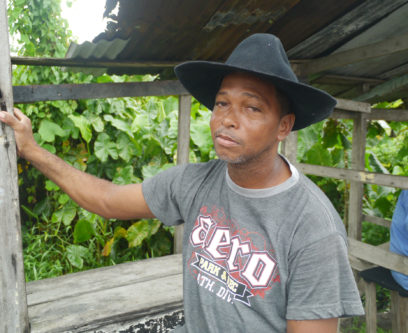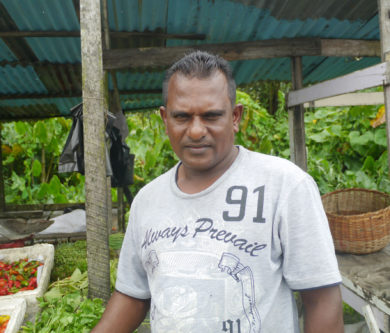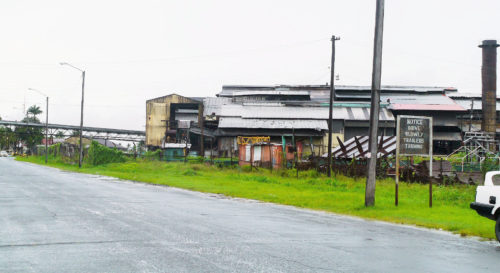With the closure of the Wales estate last December many lives have been disrupted, including those of the cane-cutters and cane transporters who are desperately trying to figure out their next source of income.
But as desperate as they are, they are not willing to take up the Guyana Sugar Corporation’s (GuySuCo) offer to work at the Uitvlugt estate and are still determined to be paid their severance benefits.
Eion Fernandes is one such worker. He told Stabroek News: “Right now I don’t know what they [GuySuCo] have us on. I don’t want to go to Uitvlugt to work. The (law) says that if you exceed 10 miles they have to pay us off.”
He was referring to the Termination of Employment and Severance Pay Act, which says that when the workers become redundant at one location and the closest alternative location for employment is more than 10 miles away, the workers are entitled to severance payments. The distance from Wales is about 32 miles, including to the cultivation.
He refutes GuySuCo’s claim that the Guyana Agricultural & General Workers’ Union [GAWU] was stopping them from taking up employment at Uitvlugt, saying: “We put our matter to GAWU that we don’t want to go and they are just supporting us.”

He pointed out that he “worked 29 years at the estate and in the end, look how they treat me… Look how they wicked.”
He was also critical of the corporation spending a huge sum of money to remove the gantry from the estate and “just to put it on the ground…” The dismantling process of the gantry was recently completed.
GuySuCo had said that the gantry would be relocated to the Uitvlugt estate, which does not have any, so that canes would no longer have to be taken out of trailers and placed at the receiving station.

Fernandes does not see the justification of the government’s decision to close the Wales estate because “it had more workforce and the cultivation was better [than the other estates]. It has cane there that can give about 16 weeks grinding.”
He added that government should have “privatized the estate so that people would get jobs…”
He plants a farm in the backdam but said right now it is difficult to access it because some of the waterways are clogged up with weeds.
No future
Another worker told this newspaper, “Wales has no future anymore. One thousand dollar is big money.”

He also said that the Schools’ Welfare Officers “should come and see how many children are not going to school. Their parents cannot afford to send them.”
Manoj Davi who worked as a cane planter at the estate said he was thankful that he received his severance payments although it was not much due to his short service.
After trying a job as a security guard and it did not work out, Davi currently operates a stall at the Wales market.
According to him, “Government supposed to open company for people to find work. They close the company which was our breadbasket in this area…”
Simon Barran, a cane-cutter and father of five, was becoming frustrated over not receiving his severance benefits.
He told SN, “Since December I am out of a proper job. First they tell us they would pay us and now they are saying that we have to go to Uitvlugt. I don’t want to go to Uitvlugt. The agreement is that if we go more than 10 miles they have to pay us severance…”
GuySuCo had said that its intention is to keep the workers on the payroll and ensure that they would have continuous employment because they [workers] had expressed concerns about losing their jobs.
It said too that if they pay the workers then their services would be severed and they can no longer take up jobs at Uitvlugt.
According to Barran, “I am entitled to that money and I would see what to do with it when I get it. If they [GuySuCo] want they can employ us again. They want us, we don’t want them.”
President of GAWU, Komal Chand had said that even if the workers are paid and jobs are available at any estate, they couldn’t be discriminated against.
“You cannot force workers to go more than 10 miles away… This is forced labour and ought not to be allowed by this government,” he had said too.
Hunting
After some hunting, Barran had eventually gotten a job in Georgetown but with the amount he spent on traveling, the salary could not compensate him and he had to quit.
His wife is generating a little income from a snack business she operates in front of their home. But with bills to pay and the children to send to school, they have had to cut back a lot on their spending to make ends meet.
Another cane-cutter, Desmond Moses, who worked 24 years at the estate told this newspaper: “I don’t know what is going on with my money. I don’t want cane to cut. I am getting old and the work is getting very hard so I would not go to Uitvlugt.”
He had a part-time business selling meat at the market and after the closure he continued it weekly, although it is not that profitable.
About 94 cultivation workers received their severance payments and later, the factory and office staff received theirs.
Some of the workers, including koker attendants, persons who are responsible for removing weed from the canals and other staff including from mechanical tillage, electrical workshop and powerhouse, have been retained.
This newspaper also spoke to Mohamed Halim Khan, a cane transport operator who has been retained along with five other operators and six chain boys.
He said the Chief Industrial Officer of GuySuCo told them at a meeting last week that they were waiting on them to go to Uitvlugt.
“But the workers already lost 10 years pay and sickness benefits because they were not part of the first crop. The reason for that is because nobody wants to go to Uitvlugt to work due to the 10-mile range,” he said.
He has to “report to work every day but would only get three weeks’ pay. I prefer to get my severance. Workers have rights too…”
He said GuySuCo wants 375 workers to go to Uitvlugt but he does not think there is enough work for them there. Wales has cane to cut for the first crop by they left it.”
He pointed out that the work was getting harder because the cane-cutter were no longer earning Annual Production Incentive, Weekly Production Incentive “or obstacle payment in the backdam anymore.”
The corporation had also said that it intends to increase the production of sugar at Uitvlugt from 20,000 tonnes to 40,000 tonnes and would require the services of the workers.
Colin Sam, a carpenter who has also been retained said, “We supposed to get pay off but GuySuCo keeping us here to punish us. We don’t have any representatives to look after us.”
They would “only get five days’ work available and we have to stay home for on holidays.” Besides, the money is far less than what he earned before.
According to him, he has a family to maintain and four bills to pay and even though he has the job he was “still punishing.”
Patrick Bacchus still has his job as an electrician and was on his lunch break when this newspaper caught up with him.
Although he was happy to still be earning, he said it was way less than what he worked for before the closure. The money cannot sustain his family and he discussed it with GuySuCo but “they said they can’t do anything.
He lamented that the “government closed the estate because it is 100 years old but the factory equipment could still go on. Now they dismantled the estate [gantry],” which is 43-years-old.”
He said Wales was the only estate that made its target in 2016 and felt that it deteriorated because of the theft of chemicals and other items.
He pointed out that although management of GuySuCo had a role to play by preventing the theft, it did nothing.
He was saddened that government “paid some workers but they can’t pay the rest. They said they keeping us for the new venture but they never came and told us about it.”
He also said that government “is expanding in rice and fish but we know that rice cannot grow there because of the chemicals. Sugar was bringing in foreign exchange but what would rice bring. We don’t have market for rice.”









